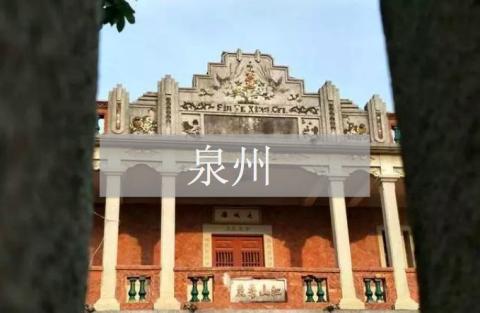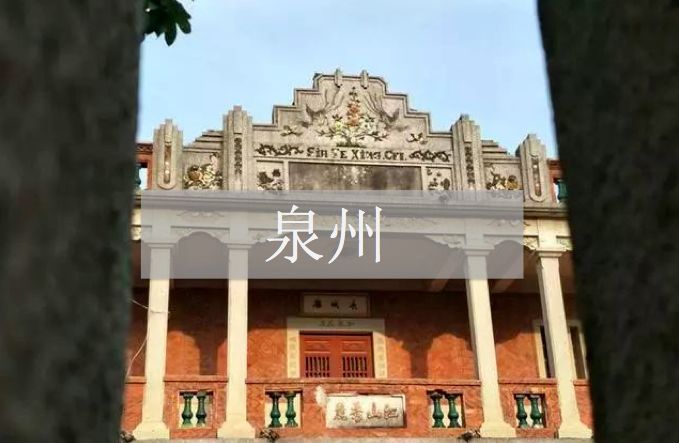

Quanzhou Chowder has more customs and is more inclusive.
"There are two chefs in our hotel kitchen. They came back with their families during the Chinese Exclusion in Indonesia in the 1950s and 1960s. At that time, the country moved a lot of land in Fujian and Guangdong to build overseas Chinese farms to accommodate them. We are going down now After dinner, I asked them to come over and talk." With that, Uncle Lin returned to his desk and made a phone call. Then we went to the restaurant downstairs.
The four of us ate, and the kitchen prepared seven or eight dishes of Southern Fujian style. They were the same as the local specialties we had come down all the way. Each dish had seafood, but it was a little different. One of the grilled sausages, the senior sister said, had a bit of Indonesian flavor. This is also a difference between Quanzhou cuisine and coastal areas such as Fuzhou. Quanzhou chowder has more customs and is more inclusive.
Indeed, the next day JF and I were walking on the streets of Quanzhou and met a funeral procession. At first glance, I thought it was a temple fair, with a group of people carrying colorful paper horses and paper houses. Next, I thought it was a military band, with more than a dozen people in two rows in the middle, wearing honor guard uniforms and playing drums and wind instruments. ;After that, there is the waist drum team; after that, there is that and so on, and the group of relatives and friends of the victim. It’s really colorful and grand. JF and I were both a little stunned. It took us a while to come back to our senses, and we all said in unison: "What... is this!" When I thought about it, this is Quanzhou, a city that has long been open to the outside world, exchanged between the East and the West, and has mixed religions. Quanzhou, in Quanzhou, has such a mixed style of teams, and it seems understandable... "This 'long queue' must be quite expensive," JF sighed.

Quanzhou Overseas Chinese Village
A chef in his fifties came over. Uncle Lin introduced that this chef came back from Indonesia during the Chinese Expulsion Period.
He sat down and followed Uncle Lin's introduction and said, "I am 1960 I came back in 2000, when I was just over a month old.”
I have read some information and opinions about anti-Chinese sentiment in Indonesia before, and each seems to have its own position. When I met someone who had experienced it to some extent, I couldn't help but ask: "What's the way to exclude Chinese people over there?"
"In 1959, the Indonesian government suddenly promulgated a regulation that stipulated that foreign retailers operating outside provinces, counties, autonomous regions and state capitals must register in 19601The business was closed before January 1 and was taken over by Indonesian national entrepreneurs or cooperatives organized by Indonesians. At that time, overseas Chinese in Indonesia were mainly engaged in the retail industry. There were as many as 83,000 retail businesses operated by overseas Chinese in Indonesia. There are more than a thousand, and more than half of them are scattered among the people in various parts of the Indonesian archipelago. Therefore, this regulation will have a huge impact on overseas Chinese. "
He continued: "It is actually difficult for the Chinese living in the countryside to come back. Our family lived in Surabaya, the second largest city in Indonesia. My father was relatively wealthy at the time and bribed some officials. 1960 Returned in June. At that time, China sent a number of ships to pick up the overseas Chinese, the "Mei Shang Mei", the "Dabaokang", the "Fu'an", and the "Haihuang", one by one. "

The "Dabaokang" cruise ship sent by the Chinese government to bring overseas Chinese back home (picture from "Micro Quanzhou" official account)
JF said: "It seems that the Chinese government still protects these expats."
"Haha, because 70% of Indonesia's economy is in the hands of the Chinese! They came back, exchanged it for gold, exchanged it for U.S. dollars, and brought all the money back. All the money in this boat is real gold and silver!" Said an Indonesian overseas Chinese chef.
The senior sister took over and said, "Yes, our classmates in the past had overseas Chinese in their families, and they were all very rich! I had a classmate who was an Indonesian overseas Chinese. In the 1980s, his parents died and left him 500 "At that time, five million dollars was a lot of money! It was an astronomical figure!"
The chef continued: "I heard from my father that when we came back, there were many people here to greet us at the pier. My grandfather also came back with my father. He was the president of the Indonesian Chinese Association before, and during the war He had donated a lot of money to the motherland. When he got to the port and passed the customs, the Chinese customs officers saw his passport and invited him to a reception room. They said to him: "You are welcome to return to the country. You want to stay." We can arrange housing and work in any city in China. 'But my grandfather said, 'I just live with them on a farm.' I didn't know my grandfather because he died a year after he came back."
When I came back to China, I ate for free. Housing, education, and medical care are all free. In our Changshan Overseas Chinese Farm, more than 20,000 and nearly 30,000 people immigrated back.
Uncle Shi explained: "There are several overseas Chinese farms in Quanzhou. Changshan Farm, Nan'an Xuefeng Farm, Shuangyang Farm, and some brick factories and fruit farms are specially designed to house returned overseas Chinese. I have a friend who came back when he was six or seven years old. He said that his mother did not want to come back, but his father must come back. When he came back, he saw that the conditions were very difficult and he had to work in the fields. However, despite the difficult conditions, the country still took good care of them and provided them with food. No money was needed and everyone had enough to eat. It was the most difficult period in China.”


Former Residence of Huang Zhongxing, a Returned Overseas Chinese from Singapore
The senior sister said: "When I was studying, we lived near an overseas Chinese farm. There were many overseas Chinese in our class, almost a dozen in each class. A lot of them spoke Indonesian, croaking, croaking, croaking."
"Do you still speak Indonesian at home?" I asked the chef.
"Speaking. We also speak Hokkien. When we went to Indonesia and spoke Indonesian to them, they thought we were locals. I went to Indonesia with my father in 1988 and upon introduction, this was my cousin. , Cousin! Our family still has six to seven hundred people in Indonesia, and it has spread to all over the world. "
"Why didn't they come back?"
"Because they do business there and do well and don't want to come back. Chinese exclusion means that Chinese people living in small towns and villages are not allowed to do business. Some sell their houses and move to big cities. Chinese are allowed to do business in big cities. The so-called "Chinese exclusion" is also caused by unrest and coups among various religions such as Muslims and Christians, and those gangsters and gangsters take advantage of this opportunity. Robbery and murder. The Chinese basically open shops and do business there, and they will suffer when the society is in chaos. There are six to seven million Chinese in Indonesia, and the government has certain prejudices against the Chinese, such as anti-communism, or the Chinese themselves. problems, the gap between the rich and the poor, the hatred of the rich, the arrogance of the Chinese in dealing with others, and the religious belief that they are "not my race"... But in a big city like Surabaya, it is rare for Chinese shops to be robbed because there are so many Chinese in Surabaya. , and pay tribute to the local underworld and police every month. But in small cities, with small businesses, there is no way to pay tribute, and there is no way to be protected. "



The returned overseas Chinese spoke foreign languages and ate Southeast Asian cuisine
When Uncle Lin was young, he worked in the Overseas Chinese Building in Quanzhou. Now, he often drinks tea, chats and plays cards in the Overseas Chinese Building with his friends. He said that in the Overseas Chinese Building, he had met many overseas Chinese, including some wealthy overseas Chinese businessmen.
One of them, Mr. Chen Yongzhai from the Philippines, once had tea together. Mr. Chen told a story. He said that there is a saying in southern Fujian: "The family is very rich. You sit on the chair at home and spread the money on the floor of the living room. If you pile up the money one by one and reach your ankles, it means you are rich."
One day, Mr. Chen’s mother asked him, “Son, everyone outside says that we are very rich. People say that money means money is piled up to our ankles in the living room. So how rich are we? "We stood up to our knees," said Mr. Chen.


